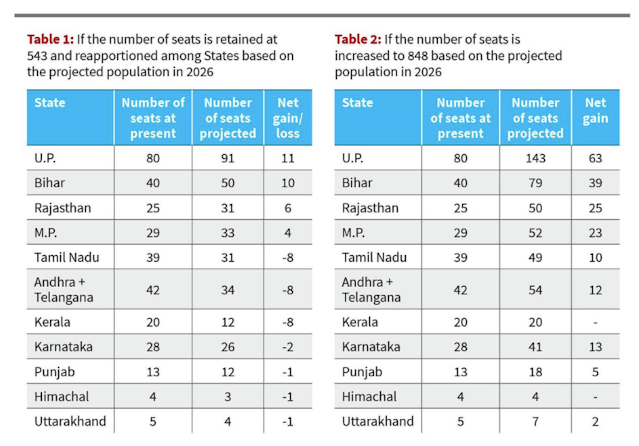#542
My Blog on a Political topic after ages!! But needs addressing!!
+++++++++++++++++++++++++++++++++
India, a country celebrated for its diversity, has always seen regional distinctions in language, culture, and development. These differences have coexisted, often in harmony, despite occasional tensions. However, a disturbing trend has emerged in recent years, where the divide between North and South seems to be widening, driven by politics, population dynamics, and resource allocation.
This conversation came into sharper focus recently when I heard Mr. N. Chandrababu Naidu, the Cheif Minister from Andhra Pradesh, (AP) make a startling statement: "Unless our population increases, Andhra Pradesh could lose seats in the delimitation process, besides burden for older people etc." As someone who has lived through the days when the mantra of population control was drilled into us—when having more than two children was considered irresponsible—this reversal of thinking was jarring. Also I recollect many Southern Chief Ministers expressing disappointment on budget allocations as well as unfair treatment on many issues/social benefits.
The Population Conundrum
For decades, South India embraced education and population control measures. States like Kerala and Tamil Nadu saw their fertility rates drop to below replacement levels (2.1 children per woman), a commendable achievement for managing resources and ensuring a better quality of life. The northern states, however, have lagged behind, with fertility rates still above 2.2.
Now, this demographic shift has brought unintended consequences. The upcoming delimitation exercise, which determines the number of parliamentary seats based on population, could severely disadvantage the southern states. Fewer people means fewer seats, even though the South has been the more responsible region when it comes to managing its population. It raises a troubling question: Are we punishing states that have done well in population control?
Uneven Revenue Distribution
It’s not just political representation that’s skewed—resource distribution is equally troubling. The South contributes significantly to India’s revenue, estimated to be around 60%, yet it receives back only 40% in central government allocations. While the figures may vary slightly depending on the source, the underlying truth remains—the South’s economic contributions are not matched by proportionate returns.
This imbalance not only hampers the growth of already thriving states but also creates a sense of injustice. If resources are not fairly distributed, how can we ensure equitable development across regions? Shouldn't the regions that are contributing more to the nation's economy see a fairer share of the pie?
Representation Imbalance: One Vote, Two Values?
Another glaring issue is the discrepancy in voter representation. In Kerala, around 1.8 million people elect a single Member of Parliament, whereas in Uttar Pradesh, it’s approximately 2.4 million. This creates a scenario where one vote in the South is effectively worth less than one in the North—a clear contradiction to the democratic principle of "one person, one vote, one value."
The question that arises is: How long can such disparities continue before they lead to serious political and social unrest?
The Potential Consequences
The increasing divide in resources, representation, and political influence could lead to irreversible damage if left unchecked. The South, despite being an economic engine for the country, might soon feel alienated from the center. This growing dissatisfaction reminds me of a chilling dialogue from history—Jinnah’s argument that the Muslim population's interests were being neglected, leading to the Partition of India. (Either my Pakistan or CIVIL WAR)
While I don’t want to sound alarmist, ignoring this growing rift could create divisions that we cannot afford. We have already seen what regional imbalances did to countries like Sudan, where disparities in resource allocation led to conflict and eventually a split.
Time for a Course Correction
India needs a thorough reassessment of its policies related to political representation and revenue distribution. Delimitation should not simply be a numbers game; it should factor in educational levels, governance, and contributions to the national economy. The time has come to revise outdated policies that no longer reflect the reality of India’s regional dynamics.
If we don’t act soon, the North-South divide may deepen into something far more dangerous than just political bickering. We cannot let the "one nation" idea disintegrate because of neglected grievances and skewed policies.
Indian leaders must rise above short-term political gains and address these issues head-on. Otherwise, the harmonious coexistence that we’ve prided ourselves on may become a distant memory, making room for regionalism, resentment, and, in the worst case, conflict.
Fact-Check Sources:
- Fertility Rates: As of the latest data, the Total Fertility Rate (TFR) in Southern states like Kerala and Tamil Nadu has fallen below the replacement level of 2.1, while Northern states, particularly Uttar Pradesh, Bihar, and Madhya Pradesh, continue to hover around or above 2.2.
- Revenue Contribution: While estimates vary, the South contributes approximately 60% of India's tax revenue but receives back much less in central allocations. A deeper analysis might be needed to pin down the exact figures, but the trend is clear.
- Representation Imbalance: Kerala has around 1.8 million people per MP, while UP has closer to 2.4 million. This gap underscores the disparity in political influence between states.
In this sensitive yet important discussion, we must strive for equity—whether in political representation, resource allocation, or regional development. Otherwise, the divide we see today may be tomorrow’s irreversible chasm. The coming generation would not be holding us in esteem!
Let me know your comments/ Thoughts?
Karthik
8th Sep 2024. (9am!). 8th Sep 2001, Landed in Lahore, didnt realise that in next 72 Hrs, History will change! That is life!






No comments:
Post a Comment